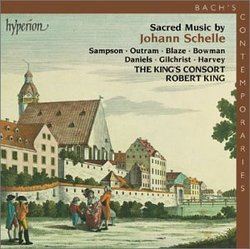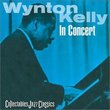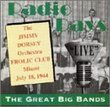| All Artists: Johann Schelle, Robert King, King's Consort, Carolyn Sampson, Rebecca Outram, James Gilchrist Title: Sacred Music by Johann Schelle Members Wishing: 0 Total Copies: 0 Label: Hyperion UK Release Date: 6/12/2001 Album Type: Import Genres: Special Interest, Classical Styles: Opera & Classical Vocal, Chamber Music, Historical Periods, Classical (c.1770-1830) Number of Discs: 1 SwapaCD Credits: 1 UPCs: 034571172606, 003457117260 |
Search - Johann Schelle, Robert King, King's Consort :: Sacred Music by Johann Schelle
 | Johann Schelle, Robert King, King's Consort Sacred Music by Johann Schelle Genres: Special Interest, Classical |
Larger Image |
CD DetailsSimilar CDs
|
CD ReviewsAnother good Bach predecessor tertius3 | MI United States | 10/16/2001 (4 out of 5 stars) "It's been enjoyable to follow the revelation by the King's Consort of just how good Bach's predecessors were (and how good the Consort, too). Schelle was the last but one kantor before the accession of J. S. Bach at the Thomaskirche, Leipzig. Bach is known to have borrowed text and melodies from Schelle, and here you can hear why. Schelle is a very good composer once famed for "divine simplicity and sweetness," according to the disc notes. The grand opening and closing pieces are festive in their pomp and verve, featuring magnificently played high cornetts and trumpets. The two funeral motets of mourning are still quietly effective. In the cantata, "Lord, teach us to remember," Schelle cleverly includes four other chorale tunes as if in fact to test the congregation's memory for them! The final Christmas cantata ends with a surprising but ineffable fade out into eternity that is not an engineering trick. The pieces well express the moods of the varied texts, and occasionally exhibit acutely expresssed word painting. They do not have as strong a musical contour as the most memorable of J.S. Bach's works. Rather than intricate counterpoint Schelle usually employs an alternation of lighter solo voices and small choral tutti, often in parallel motion with simple sweet harmony from strings and continuo. These pieces do not sound like exotic antique music but are solidly within the Protestant choral tradition and worth reviving today. Unlike the preceding Knüpfer disc in this series from the King's Consort, each of the 5-11 minute pieces is assigned only one track number (and when did you last see an index number for access to subsections?). That won't help learning them. Twice I thought I heard voice entries clipped short by the engineers. Note that the order of the commentary in the text differs from the order of the music on the disc. Although Schelle's music was preserved haphazardly on musty paper, we can be glad. One wonders, what are the chances another 300 years from now for today's music on acidic paper, magnetic tape, or plastic CD?" For now, a very worthy effort M. Holmes | Washington D.C., United States | 06/22/2003 (5 out of 5 stars) "While one of the other reviewers has brought up some valid criticisms, I'd like to point out that these are minor issues that in my opinion warrant a higher-than-four-star rating. From a historical point of view, one could even claim that King's decision to record the works of Johann Schelle at A=440 pitch instead of the more appropriate A=466 is cause for a reduction in its validity. However, I shall take a view from a period performer's perspective. The choice to perform or record at A=466 is a very [costly] one. For example, some of the wind players would need to buy entirely new instruments, because the pitch adjustment of transposing up a half tone is far too awkward and unnatural for the lower-pitched instruments. Also, making copies of old instruments at A=440 is really a modern compormise. Roland Wilson's ensemble "Musica Fiata" from Köln, Germany actually required their sackbut (trombone) players to transpose the music up one half-tone in their recent Schelle recording. This transposition makes the fundamental pitch of the trombone A instead of B-flat. However, their cornetto players performed on instruments actually made for high pitch. Perhaps the King's Consort is not yet ready for a change to high pitch. I am certain that they have seriously considered this as well as the considerable timbral differences that this makes. For the Brits, this is a practical compromise, and I'm sure that very soon, the late seventeenth-century repertoire will soon be played in the UK at the right pitch.All things considered, I'm basing my five-star rating mainly on the performance and the general production. I know the Hyperion label very well, and I admire the great things they are doing for music listeners of refined tastes. King meets the incredible challenge of this rare music with great flair. When compared to the "Musica Fiata" recording of Schelle's cantatas and sacred concertos on the CPO label, I would probably rate MF a bit higher. However, if one is interested in exploring the unique wealth of Schelle's sound world, one should probably own both of these CD's, which offer mostly different works. In common with both recordings is the concerto "Lobe dem Herrn, meine Seele." The execution of the sophisticated and highly difficult trumpet parts on Wilson's recording is by far superior to King's result. However, this doesn't mean that King's recoding is negative.Of special note in the present recording is the ravishingly beautiful (in a Lutheran pietist sense) performance of the concerto "Christus, der ist mein Leben" which is scored for four separate violins, four gambas, soloists, choir and continuo. Also, the cantata "Von Himmel kam der Engel Schar" is likely to surprise anyone who is skeptical about late seventeenth-century German church music as being "inferior" to "J.S. Bach the pinnacle of the baroque age." Just by listening to the opening of this cantata, one can hear very clearly that Bach developed from a steadily evolving cultural tradition and that he did not emerge suddenly from a vacuum. One wonderful instrument that was curiously falling out of use in Bach's day was the cornetto, a highly agile chromatic instrument with a history of its own, separate from the trumpet. In Schelle, we can hear the mixture of trumpets, cornettos and trombones. This creates a splendid texture, which in many ways allows the music even more fluidness and expressivity that much eighteenth-century music lacks.
I salute Robert King for helping to finally uncover the still under-recorded (and under-published) riches from the era between Schütz and J.S. Bach. Recommended are the other two Hyperion CDs in this series: church concertos and cantatas by Knüpfer and Kuhnau, two masters in the long line of great cantors of the Thomaskirche in Leipzig." |




